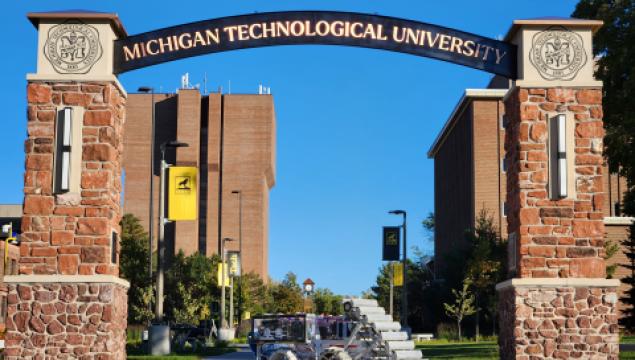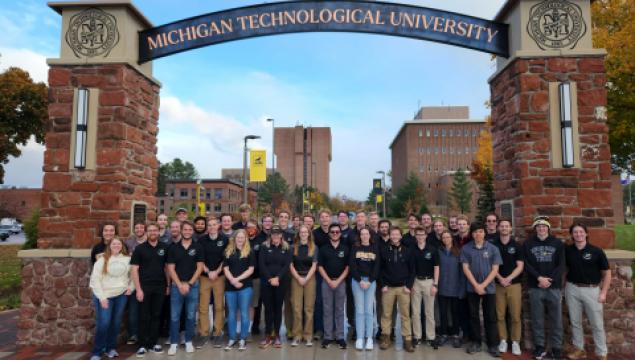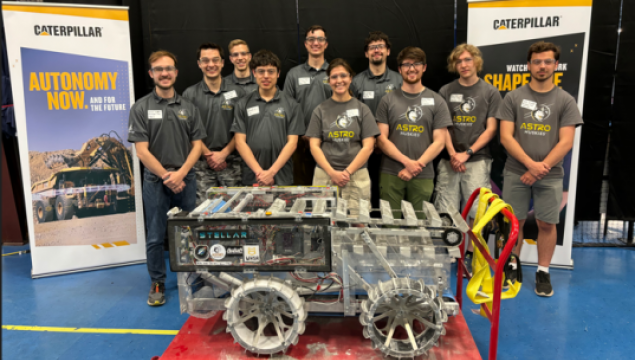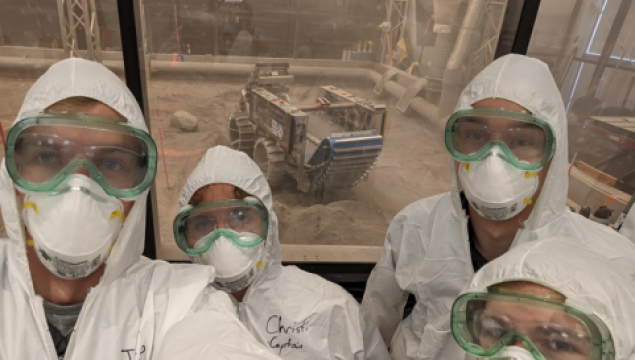Multiplanetary Innovation Enterprise Astro-Huskies Rover for NASA Lunabotics
Why This Project Is Important
NASA has several inter-university competitions that align with their goals for their ongoing Artemis Missions. An unavoidable obstacle of space travel is what NASA calls the "Space Gear Ratio", where to send one package into space, you need nearly 450 times that package's mass in expensive rocket fuel to send it into space. So in order to establish a long-term presence on other planets and moons, we need to be able to effectively acquire the resources around us, known as in-situ-resource utilization, or ISRU.
The NASA Lunabotics competition allows university student teams to show what autonomous robots they have developed to traverse around obstacles such as mounds, craters, and rocks before they can begin assisting in construction of a landing pad by creating berms. By demonstrating their robot, teams contribute ideas to NASA's future missions to operate on and start producing consumables on the lunar surface.
Project Description
The Astro-Huskies are a group of 42 students that are currently working on an autonomous construction rover for the NASA Lunabotics competition to be held in May 2025 at NASA’s Kennedy Space Center (KSC). The rover will need to be capable of traversing around craters and rocks in the obstacle zone, excavate regolith and other materials from the excavation zone, and then build a berm in the designated area within the construction zone. The goal of this rover is to aid in the construction of a launch pad on the moon. The berm it constructs will protect surrounding buildings and infrastructure from a rocket launch or landing. The rover should be able to create as big of a berm as possible with as low of a rover mass and energy consumption as possible. The competition this year will consist of two 15 minute qualifier runs at the University of Central Florida’s (UCF) Exolith Labs where the team will compete to make the top 10. If the team finishes in the top 10 at UCF, they will qualify for the finals at KSC where they will compete in two more 30 minute runs. These final two runs will decide which team has the best rover for the Lunabotics competition for 2025.
The competition requires a systems engineering approach which is an elaborate version of the engineering design process as well as public outreach events and a heavy focus on automation. This will be the team’s fourth year attending the in-person competition, and the team will be spending the 2024-25 school year learning from their previous design based on the experience gained from their last competition. The team will then move onto the manufacturing, building, and testing stages. In May, the team will head to the Kennedy Space Center to compete against 49 other college teams. Funding is needed for parts of the robot and for the travel costs of sending the team to NASA Kennedy Space Center in May 2025.
We are very excited to have been selected to be a part of this competition and to represent Michigan Technological University and its crazy smart students well!
Visit the Lunabotics and Multiplanetary Innovation Enterprise Website!
Meet the Researchers

Nicholas Miller
Nicholas (Nick) Miller is a 4th year Mechanical Engineering student with a Minor in Aerospace Engineering at Michigan Technological University (MTU). Nick has been on the Multiplanetary INnovation Enterprise (MINE) for 2 semesters as the Excavation mechanical lead for the Lunabotics Astro-Huskies. This year Nick will lead the Astro-Huskies as project manager for the 2024-25 Lunabotics competition.

Asher Zeyl
Asher Zeyl is a third-year mechanical engineering student at Michigan Technological University, minoring in aerospace engineering. He currently serves as the Assistant Project Manager for the Lunabotics program, where he is responsible for project coordination, managing timelines, and ensuring effective communication among the various subteams. Prior to taking on this leadership role, Asher was a member of the Mobility and Drivetrain Subteam, contributing to the design and development of essential systems for the Lunabotics lunar excavation robot, with a particular focus on improving its mobility and drivetrain performance in simulated lunar environments. His involvement in the Lunabotics program reflects his commitment to advancing engineering solutions for space exploration, while also allowing him to apply and expand his skills in both mechanical and aerospace engineering.

Ben Christians
Ben is a 4th-year Mechanical Engineering major at Michigan Technological University, also working toward minors in Aerospace and Mathematics. Ben has been a member of the Multiplanetary Innovation Enterprise's Lunabotics team for two semesters, during which he was the Systems Engineering & Integration Sub-team Lead. He is currently serving as the project's Lead Systems Engineer for the 2024-2025 competition year.

Paul van Susante
Dr. van Susante grew up in The Netherlands, received a Master of Science from Delft University of Technology in 2001 in Civil Engineering with an emphasis on Building Engineering. He then went to the Colorado School of Mines (CSM) to participate in NASA research and received a Master of Science in Engineering Systems from CSM in 2004 followed by a Ph.D in Engineering Systems from CSM in 2011. Dr. van Susante taught Freshman, Sophomore and Senior Design as well as Mechanics of Materials for five years at CSM before coming to Michigan Technological University in 2012. He was a NASA Faculty Fellow in 2010 and consulted for a variety of companies on SBIR or STTR projects such as University of Arizona, Sysrand Corporation, Energid, HoneyBee Robotics and others. He has been involved in research projects for many customers including Lockheed Martin, DARPA, NASA KSC, JPL, Bechtel, Caterpillar, NCHRP, NSF and others.
days left
funded
last
What Your Donation Can Help Us Do:
- Offset travel costs for students to participate in the competition.
- Purchase robust rover materials, actuators, state-of-the-art sensors and control system components.
$50 3 Funders
Company/Full Name on Website
$100 0 Funders
Company Logo on Website – Picture of team w/Robot
$250 0 Funders
Email Update on Project Progress
$500 1 Funder
Virtual Invitation to Design Reviews
$1,000 0 Funders
Logo / Name on T-Shirt Worn to Competition
$2,500 0 Funders
Logo/Name on Rover
$5,000 0 Funders
Commemorative Plaque
$10,000 0 Funders
Invitation to MTU for Live Demo & Tour
Recent Donors
Some donors may be hidden.







 Gifts to projects listed on SUPERIORIDEAS.ORG are received and processed by Michigan Tech Fund. Michigan Tech Fund is a tax-exempt organization under Section 501(c)(3) of the Internal Revenue Code acting on behalf of Michigan Technological University. It is the policy of Michigan Tech Fund that a portion of the gifts and/or income therefrom may be used to defray the costs of raising and administering the funds.
Gifts to projects listed on SUPERIORIDEAS.ORG are received and processed by Michigan Tech Fund. Michigan Tech Fund is a tax-exempt organization under Section 501(c)(3) of the Internal Revenue Code acting on behalf of Michigan Technological University. It is the policy of Michigan Tech Fund that a portion of the gifts and/or income therefrom may be used to defray the costs of raising and administering the funds.